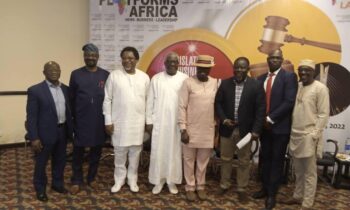…See the action as capable of discouraging investors
The Nigerian Senate came under severe criticism from stakeholders who viewed its directive that the Nigeria Liquefied Natural Gas Company Limited( NLNG) should payN18 .4 billion to its host communities as a great disincentive to potential investors eyeing the country.
According to the stakeholders that spoke at an event organized by Platform Africa Forum 22 which took place at Sherato Hotels Lagos concluded that the upper chamber lacks the power to give such directive or order because it is not a law court.
According to Dr. Ayodele Oni, Partner, Bloomfield Law Practice, who spoke from Houston, Texas, and the Keynote speaker, Barrister Jide Ologun, unanimously declared that the Senate’s power guarantee by the constitution is enormous but this does not include giving an order to a company to Pay money within a stipulated time.
“The Senate is not a court. That right to order resides solely with the court,” Ologun said.
All lands belong to the government, and it was the government that gives them the land. In addition, it was confirmed that the NLNG paid N73 million in 1989, any other thing the NLNG is doing will only amount to Corporate Social Responsibility (CSR). The directive for the company to pay will only mount a roadblock to the Foreign Direct Investment (FID).
Taiye Obateru, immediate past spokesperson for the Nigeria National Petroleum Company NNPC aligned his view with those of the speakers above, adding that all the company is required to be doing now is Corporate Social Responsibility (CSR ).
This he said is just to enhance good neighbourliness between the company and its host communities.
Veteran energy journalist and analyst, Tajudeen Adigun, who stated that Nigeria’s energy sector is suffering dearth of FID with many companies folding up due to legislation, urged the 10th National Assembly to concentrate on making laws that will engender FID.
“The Senate has the constitutional oversight function but in discharging this role, it must always consider the ease of doing business.
The communities must be protected while companies too deserve protection to succeed. The NLNG is a company bounded by law and anyone enraged by action or inaction of the company should approach a Court for redress. Well, they can write a petition to the NASS and the parliament too has the right to accept the petition and look into it. But only the Court, not the NASS, has the right to make an order for a company to pay within a stipulated time. The bottomline is that the parliament should consider ease of doing business in discharging its legislative duties.”
Recall that the Nigerian Senate, in September 2022, ordered the NLNG Limited to pay N18.4 billion on its acquired land for Right of Way (RoW) to 73 host communities and 200 families in Bonny, Rivers State, within two months.
The Senate, which had received a petition from the communities through its Committee on Ethics, Privileges and Public Petitions, confirmed that the NLNG actually paid N73 million in 1989 when it acquired the land for its right of way (RoW). It, notwithstanding, issued a directive that the NLNG has just two months to pay up.
The NLNG, in a statement issued a day after the Senate’s directives, simply said it was evaluating the resolution and circumstances surrounding it. It adds: “NLNG wishes to state that it has always conducted its business responsibly and in accordance with the laws of the Federal Republic of Nigeria, including in this specific matter.”
While some have argued that the NLNG, should reagrdless of the initial payment in 1989, obey the NASS and pay off the newly ordered N18.6bn, others who perceived the Senate action as setting the people against the NLNG (the duo has reportedly enjoyed mutual relationship for long) have argued that the NASS is not a Court that should issue a directive for a company to pay certain money within a stipulated time.
The key speaker at the event and other speakers, Jide Ologun, at the event also encouraged African governments to create and implement enabling legislations for business survival
Governments across African continent have been urged to create and adequately implement enabling legislations that would aid the survival of businesses.
Some other Speakers at the maiden edition of the Platforms Africa Continental Forum, Lagos 2022, said the harsh operating environment is posing grave danger to survival of business in Nigeria and some African countries including Ghana and Kenya.
A Nigerian Constitutional Lawyer and Former Chairman, Chartered Institute of Personnel Management (CIPM), Ikeja Branch, Jide Ologun, in his presentation at the forum bemoaned poor implementation of policies, which has further improverished the citizens despite huge natural resources inherent in the country.
He said Africa is so blessed with a population of 1.4 billion people, while Nigeria with a population of over 200 million has over $441 billion Gross Domestic Product (GDP) as at 2021.
Ologun added that “Nigeria is so blessed with abundant resources, but it is unfortunate that no fewer than 133 million, about 63% of the population are currently living in multi-dimessional poverty,”
Giving an example of Liz Truss who reigned as the prime minister in the United Kingdom having seen that her policies may not rescue the prevailing situation in that country, he challenged Nigerian legislators to ensure that the commonwealth of Nigeria is utilised for the common good of its people.
He empahised the fact that Nigeria has oil in abundance but the masses can hardly state categorically the benefits enjoyed from the resources so far.
Stating that Nigeria has bitumen in abundance, he said Nigeria should not suffer bad roads, because we have the resources in abundance.
He said Nigeria has flared enough gas that could provide electricity for about 8 million citizens.
“It is unfortunate that our assets are fast becoming a liability,” For example, real cocoa is from Nigeria but the finest of chocolate cannot be traced to Nigeria.
Ologun said: “More than $3.3 billion has been lost to oil theft since last year and at a time when other oil producers are having petrodollars splurge Nigeria can’t even meet it’s production quota.”
Describing oil theft as large-scale economic sabotage, he said this is to show that Africa does not lack resources, but Africa needs resourcefulness.
Being specific about Nigeria, Ologun said although the nation has laws to facilitate prosperity, but the implementation is very poor.
“We need conscientious leadership,
Legislations have a critical role to play in business survival in Africa, and committed implementation will is the vehicle for creating a prosperous continent and country that delivers value to its citizenry within the confines of good governance,” he said.
Ologun urged all arms of government to work relentlessly to ensure an improved standard of living for the citizenry.
Partner, Bloomfield Law Practice, Ayodele Oni, said business owners usually adopt different survival strategies during harsh times. In Nigeria a large percentage of start-ups die within a short period.
He said the failure of start-ups has been linked to the inconsistency of govt policies, the applicable regulations, and multiple taxations among others.
Oni said the ninth Nationals Assembly has tried to encourage businesses with the passing of start up law recently. He added that they have been prolific in passing bill into law such as the Civil Aviation Act, Petroleum Indutry Act, Terrorism Act, Electoral Act and the Start-Up Act, among others.
He said: “It is not sufficient to have laws without implementation,”
Oni said the 10th National Assembly should do more around the ease of doing business, insecurity which has largely affected businesses, and build infrastructure.
“They should also encourage the private sector, privatise some critical infrastructure, and rejig the educational system,” he said.
A top Ghanian government and public affairs analyst, Francis Kokute, said: “Our politicians don’t seem to understand what benefits democracy offers us. Unfortunately, our legislators think about their political party first before thinking about the larger society, but this is killing our democracy.
“I think that we were not prepared for democracy. It was like something imposed on Africans and it is hanging on our necks. Africa should be looking at a redefined democracy to suit us,” he said.
A renowned public Affairs analyst and journalist in Kenya, Bosire Japheth Ontiri said the same scenario plays out in Kenya where businesses struggle to survive due to lack of enabling environment.
Ontiri said political intrigues in Kenya has gone so deep that is currently eroding investors confidence.
He said there is hope for Africa because its resources are enough to feed the world.
He urged the legislators and everyone in public office to be transparent and dedicated to improving the standard of living of the citizenry.

Olusola Bello




